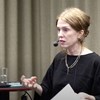interdependent
Stephanie Collins: Interdependent Responsibility for Structural Injustice
Venue: Institute for Futures Studies, Holländargatan 13 in Stockholm, or online.Research seminar with Stephanie Collins, Associate Professor at Monash University. Her research spans all areas of moral
Equity, Justice, Interdependence: Intergenerational Transfers and the Ageing Population
How the state can afford pension and healthcare costs for ageing populations, and who should carry the burden has become a central question. Thus far, focus has been on public transfers while neglecti
Governing the Climate-Energy Nexus: Institutional Complexity and Its Challenges to Effectiveness and Legitimacy
Cambridge University Press Combating climate change and transitioning to fossil-free energy are two central and interdependent challenges facing humanity today. Governing the nexus of these challenges

Kirsty Gover: Aboriginality and Alienage: Legal Pluralism at the Australian Border
Research seminar with Kirsty Gover, Professor at Melbourne Law School. Abstract The landmark Australian High Court case of Love-Thoms (2020) raised the possibility of constitutionalised Indigenous-sett
Completed: Conflict, cooperation and equality
Our social networks are widening, our society is becoming more egalitarian and violent social conflicts are decreasing. What is the connection between these three long-term and persistent trends?
Kirsty Gover: Aboriginality and Alienage: Legal Pluralism at the Australian Border
Place: At the Institute for Futures Studies, Holländargatan 13, Stockholm, or online. Research seminar with Kirsty Gover, Professor at Melbourne Law School. REGISTER AbstractThe landmark Australian High C
Social choice, nondeterminacy and public reasoning
Res Philosophica 98 ABSTRACT This article presents an approach to how to make reasonable social choices when independent criteria (e.g., prioritarianism, religious freedom) fail to fully determine what t

The Institute for Futures Studies - What we do
The Institute for Futures Studies is an independent foundation that conducts research on important questions that shape our future society. Based on four themes, we investigate critical issues for the
The Future Landscape
This preliminary study of central actors in the future landscape argues that there is a spectrum from institutions claiming independent expertise and scientific certainty about the future, to those fo
Debunking and Disagreement
Noûs, (Early View), DOI: 10.1111/nous.12135. Introduction A familiar way of supporting skeptical doubts about the beliefs in some area, such as ethics orreligion, is to provide a “debunking argument” agaiway is to appeal to the disagreement that occurs in the area.2 These types of challenge areoften treated separately and there is not much overlap in the literature they have given rise to.Yet, as they pursue the same conclusion—that the target beliefs are not (fully) justified andthat we should reduce our confidence in them—one might well wonder how they are related.Are they entirely independent or do they interact in non-trivial and interesting ways? That isthe question I shall explore.








